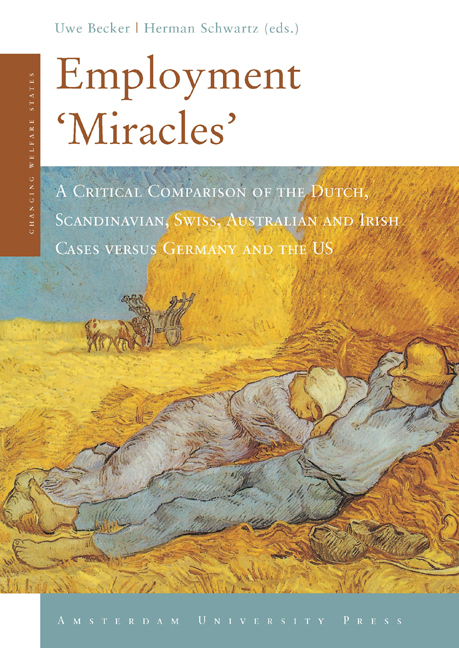 Employment 'Miracles'
Employment 'Miracles' Book contents
- Forntmatter
- Contents
- Preface
- 1 Introduction: Miracles, Mirages and Markets
- 2 The Dutch Model: Magic in a Flat Landscape?
- 3 Employment and Unemployment in Denmark and Sweden: Success or Failure for the Universal Welfare Model?
- 4 The Evolution of the Finnish Model in the 1990s: From Depression to High-Tech Boom
- 5 The Swiss Miracle: Low growth and high employment
- 6 Recasting the Story of Ireland’s Miracle: Policy, Politics or Profit?
- 7 The Australian Miracle: Luck, Pluck or Being Stuck Down Under?
- 8 Last Year’s Model? Reflections on the American Model of Employment Growth
- 9 The German Contrast. On Bad Comparisons, Special Circumstances, Luck and Policies That Turned Out to Be Wrong
- 10 Conclusion: The Importance of Lucky Circumstances, and Still the Liberal-Social Democratic Divide
- Bibliography
- Contributors
- Index
8 - Last Year’s Model? Reflections on the American Model of Employment Growth
Published online by Cambridge University Press: 15 January 2021
- Forntmatter
- Contents
- Preface
- 1 Introduction: Miracles, Mirages and Markets
- 2 The Dutch Model: Magic in a Flat Landscape?
- 3 Employment and Unemployment in Denmark and Sweden: Success or Failure for the Universal Welfare Model?
- 4 The Evolution of the Finnish Model in the 1990s: From Depression to High-Tech Boom
- 5 The Swiss Miracle: Low growth and high employment
- 6 Recasting the Story of Ireland’s Miracle: Policy, Politics or Profit?
- 7 The Australian Miracle: Luck, Pluck or Being Stuck Down Under?
- 8 Last Year’s Model? Reflections on the American Model of Employment Growth
- 9 The German Contrast. On Bad Comparisons, Special Circumstances, Luck and Policies That Turned Out to Be Wrong
- 10 Conclusion: The Importance of Lucky Circumstances, and Still the Liberal-Social Democratic Divide
- Bibliography
- Contributors
- Index
Summary
Introduction
Throughout the 1990s (and before the economic tribulations of 2001 and 2002) the American economy was a source of adulation and envy. The stock market demonstrated unprecedented growth, corporate profits surged to double digits as a percentage of national income, and unemployment fell to its lowest point in 24 years (Business Week, September 29, 1997, p.3546; Bernstein, September 1, 1997; Commission of the European Communities, 6/93, pp. 11, 40). These features of economic life prompted all sorts of congratulatory self-adulation in the business press; for example, Business Week (May 19, 1997) described it as the “wonder economy” These successes also prompted recommendations to languishing European economies regarding the adoption of flexible work regulations, social benefits systems more conducive to job-seeking, and tax incentives for corporate investment (OECD 1996a).
The varieties of capitalism literature classifies the USA as a classic liberal market economy (LME), in which firms’ competitive strategies and general employment growth rely on low-wage, low-skilled jobs. This model contrasts with coordinated market economies (CME), in which companies compete in market segments that rely on highly skilled workers and derive economic advantage from human assets and institutional coordination. Analysts in this tradition assert that in CMES, employers, workers and the state all set a high priority on competitiveness in world markets and develop collective organisational mechanisms to enhance their export position in the areas of wage negotiations, training, research and development, and setting product standards. Thus, a relatively developed welfare state and system of worker skills development are viewed as essential to the functioning of the economy (Estevez-Abe, Iversen and Soskice 2001). According to the model, LMES have traditionally had less open economies and are less likely to pursue profits through high-skilled production; indeed, lme employers derive profits by squeezing rather than by cooperating with organized labour and have more limited needs from systems of social protection and training (Hall and Soskice 2001; Kitschelt et al. 1999). While those writing in the varieties tradition seldom make normative claims about the advantages of the LME model, the American recipe for economic successes has been promoted widely in the popular press.
This essay calls into question the model characteristics of the us economy, as well as the imputed lessons from this uneasy stereotype.
- Type
- Chapter
- Information
- Employment 'Miracles'A Critical Comparison of the Dutch, Scandinavian, Swiss, Australian and Irish Cases versus Germany and the US, pp. 183 - 204Publisher: Amsterdam University PressPrint publication year: 2005


